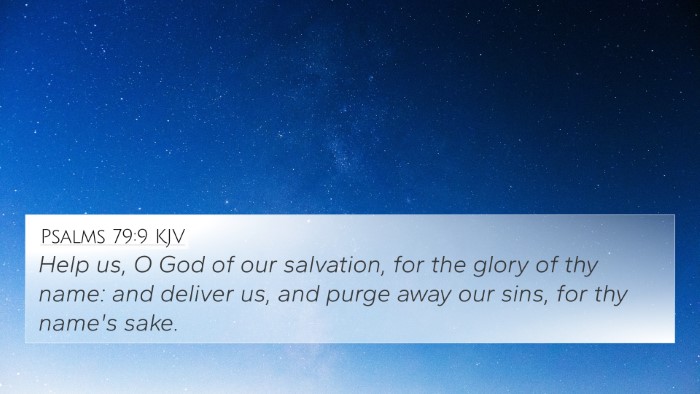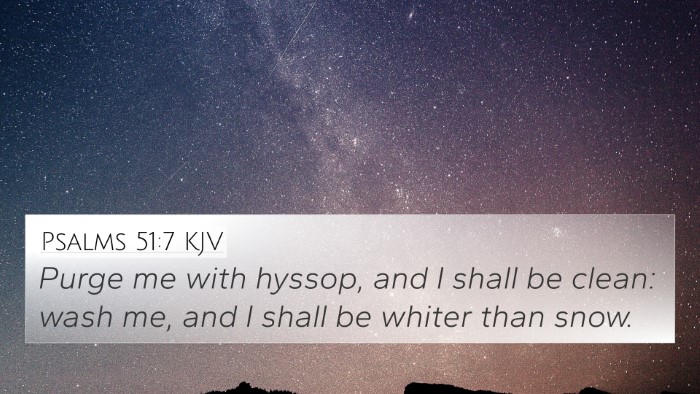Understanding Psalms 65:3
Psalms 65:3 states, "Iniquities prevail against me: as for our transgressions, thou shalt purge them away." This verse encapsulates profound theological insights and themes of divine forgiveness, human transgression, and the grace that God extends to humanity. Below is a detailed analysis based on respected public domain commentaries.
Verse Meaning and Insights
Overview of the Verse: The psalmist acknowledges the weight of iniquities—the sins and moral failings that overwhelm him. However, he trusts in God's merciful nature, affirming that while sin may dominate, God's capacity to cleanse and restore is unparalleled.
Matthew Henry's Commentary
Matthew Henry emphasizes the theme of divine grace. He suggests that this verse reveals the reality that although sin abounds, God's grace abounds even more. The psalmist reflects on his helplessness under the burden of iniquities yet maintains hope in God's promise to purge transgressions.
Albert Barnes' Commentary
Albert Barnes elaborates on the idea of human frailty and the need for divine intervention. He notes that while our iniquities can seem overwhelming, God's willingness to forgive is a cornerstone of His character. This verse serves as a reminder of the constant need for repentance and the assurance of God's ability to remove sin.
Adam Clarke's Commentary
Adam Clarke focuses on the contrast between sin and redemption. He points out that while the psalmist acknowledges the prevalence of iniquity, he also recognizes that God has the power to cleanse and restore humanity. The emphasis is on hope and redemption through repentance.
Connections with Other Bible Verses
This verse resonates with various other scriptures that speak on similar themes of sin, transgression, and divine forgiveness. Here are some relevant cross-references:
- 1 John 1:9: "If we confess our sins, he is faithful and just to forgive us our sins, and to cleanse us from all unrighteousness."
- Isaiah 1:18: "Come now, and let us reason together, saith the Lord: though your sins be as scarlet, they shall be as white as snow."
- Psalm 51:1-2: "Have mercy upon me, O God, according to thy lovingkindness: according unto the multitude of thy tender mercies blot out my transgressions."
- Micah 7:19: "He will turn again, he will have compassion upon us; he will subdue our iniquities; and thou wilt cast all their sins into the depths of the sea."
- Hebrews 8:12: "For I will be merciful to their unrighteousness, and their sins and their iniquities will I remember no more."
- Romans 5:20: "Moreover the law entered, that the offense might abound. But where sin abounded, grace did much more abound."
- Psalm 103:12: "As far as the east is from the west, so far hath he removed our transgressions from us."
Thematic Connections
The themes of grace, forgiveness, and sin witnessed in Psalms 65:3 are not isolated concepts. Instead, they permeate throughout the Bible. By utilizing tools for Bible cross-referencing, one can explore how these themes are elaborated in different texts:
- Exploring sin's consequences in James 1:15 - "Then when lust hath conceived, it bringeth forth sin: and sin, when it is finished, bringeth forth death."
- Understanding God’s character as a Redeemer in Job 33:27-28 - "He looketh upon men, and if any say, I have sinned... he will deliver his soul from going into the pit."
- Examining the role of confession and repentance in Proverbs 28:13 - "He that covereth his sins shall not prosper: but whoso confesseth and forsaketh them shall have mercy."
How to Utilize Cross-References
Cross-referencing Bible texts is essential for a deeper understanding of scripture. Here are some methods:
- Utilizing a Bible concordance allows for identifying specific keywords and finding connected verses.
- Employing a cross-reference Bible study guide can assist in systematic exploration of theological themes.
- Engaging in comparative Bible verse analysis through thematic studies can unveil links between different scriptural passages.
Conclusion
Psalms 65:3 serves as a powerful reminder of the complexities of sin and the grace of forgiveness. It highlights our human frailty while assuring us of God's compassionate capacity to cleanse and restore. By exploring related scriptures and employing cross-referencing techniques, believers can enrich their understanding of God’s word and His promises. This verse exemplifies not only the struggle against iniquity but also the profound hope found in divine mercy.


















